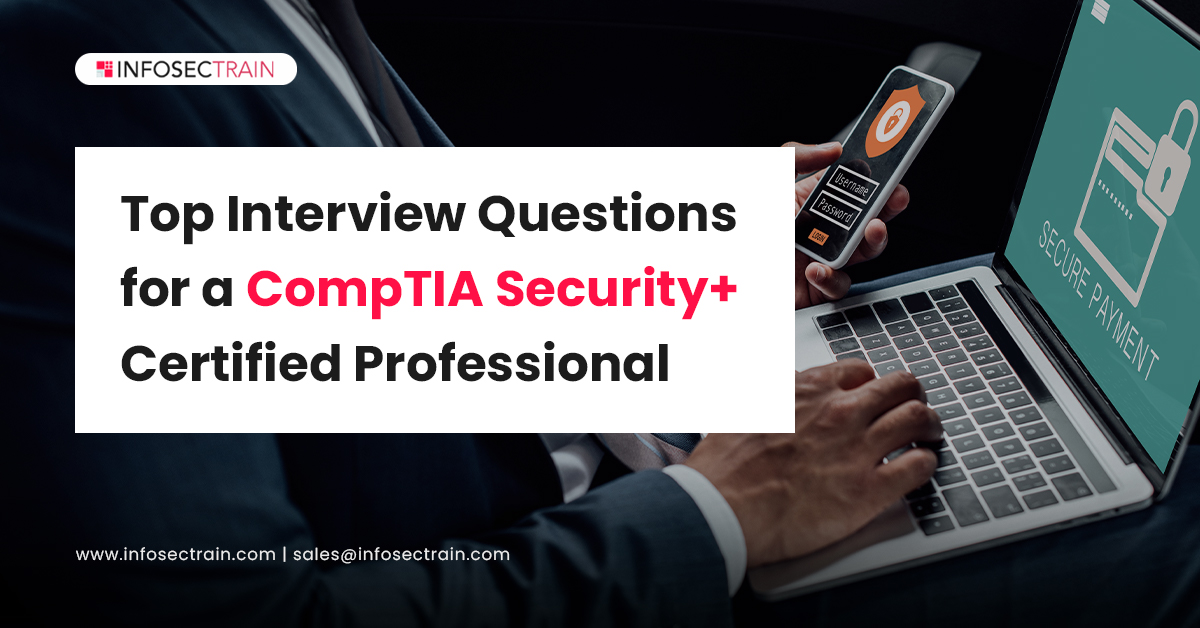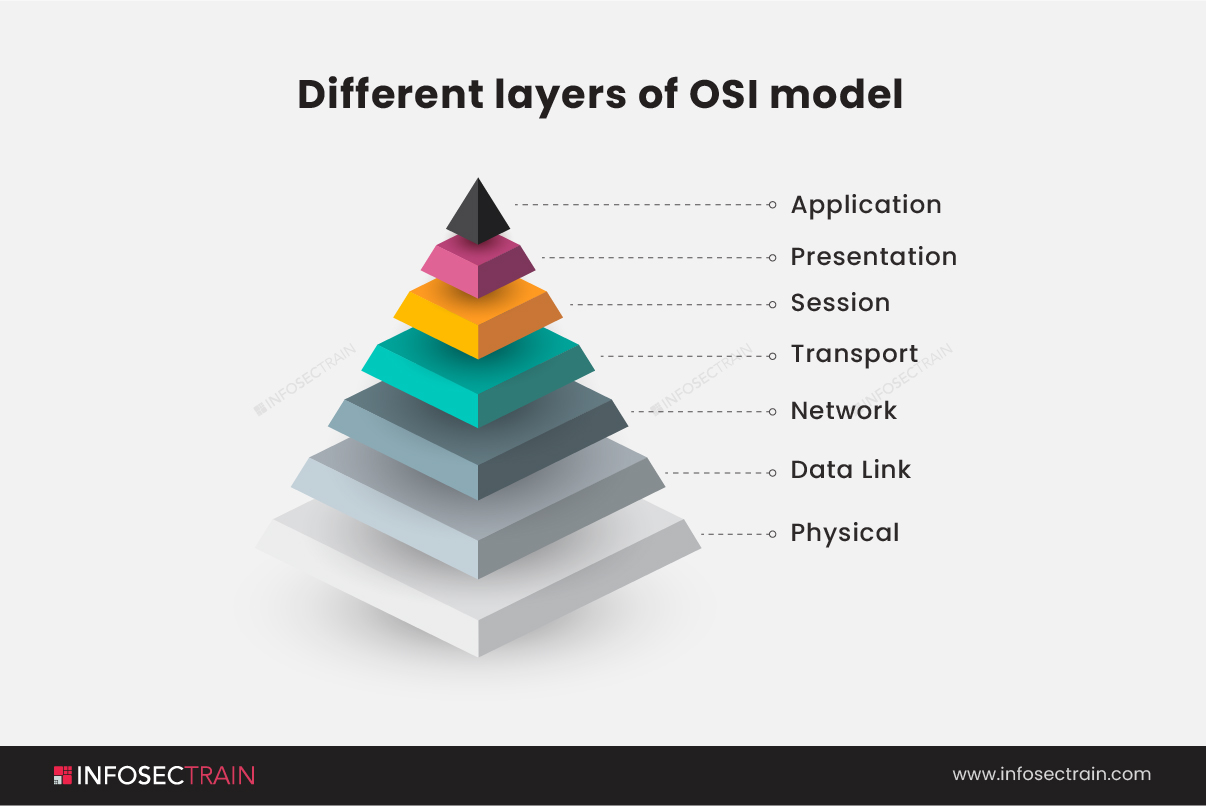Top Interview Questions to Master as a CompTIA Security+ Certified Professional
Cybercrime, according to reports, now risks billions of dollars of assets and data. We have so many access points, public IPs, constant traffic, and loads of data to exploit in today’s day and age. Hackers are having a lot of time to exploit vulnerabilities and develop malicious software for sale. As a result, cybersecurity professionals are in huge demand across all industries.

There are several cybersecurity-certified professionals in the market today. But being CompTIA Security+ certified offers you a chance to learn core cybersecurity skills. So, if you are a CompTIA Security+ certified professional with a cybersecurity job interview coming up, here are the latest interview questions and answers you should master.
Question 1: What can you do to defend yourself from multiple login attempts?
Answer: You can set up a lockout policy that prevents users from logging in after a certain number of failed attempts.
Question 2: Would you prefer Windows or Linux as your operating system?
Answer: This question does not have an ideal answer. You must have a thorough knowledge of both operating systems. Linux, as we all know, is regarded to be virus-free and far more secure than Windows. Before you provide your answer, make sure you explain the advantages and disadvantages of each Operating System in depth.
Question 3: What Is the Purpose of a Firewall?
Answer: A firewall is a security device that can help safeguard your network by filtering traffic and preventing outsiders from having unauthorized access to your computer’s confidential data. It can be either hardware or software.
Question 4: What do you understand about Gateway?
Answer: A gateway is a computer network node or router that serves as a critical stopover point for the data on its way to or from other networks. We can communicate and send data back and forth thanks to gateways. Without gateways, the Internet would be useless to us.
Question 5: Determine the difference between a gateway and a router.
Answer: A router is a computer networking layer system that manages and forwards data packets. A gateway, on the other hand, is merely a device or piece of hardware that operates as a “gate” across networks. It might alternatively be described as a network node that serves as an entry point for other nodes.
Question 6: What is Cross-Site Scripting (XSS), and how does it work?
Answer: Cross-Site Scripting (XSS) is a web security vulnerability that allows an attacker to manipulate how users interact with a susceptible application. It will enable an attacker to get around the same-origin policy, which keeps websites separate from one another. They are injection attacks in which malicious scripts are inserted into otherwise trustworthy and simple websites.
Question 7: What methods will you use to keep track of malicious activity on our systems?
Answer: IDS, IPS, DLP, SIEM, and NBAD are tools that can be used to detect malicious activity. Some are evolutions of others, and some are strictly focused on specific types of behavior or malicious activity. Still, they are all designed to help you discover malicious activity on your system and alert your IT staff so that the necessary response may be initiated.
Question 8: What is the purpose of port 443?
Answer: Computers utilize port 443 as a virtual port to divert network traffic. Port 443 is used for HTTPS (Hypertext Transfer Protocol Secure).
Question 9: What is the OSI model, and what are the different layers of the OSI model?
Answer: The Open Systems Interconnection or OSI Model is a conceptual framework for describing the functions of a networking system. In order to facilitate interoperability between various devices and applications, the OSI model describes computing functions into a universal set of rules and standards. The connections among computing systems are divided into seven abstraction layers in the OSI reference model:

Question 10: What is a Protocol Analyzer?
Answer: A Protocol Analyzer is a Software that captures and monitors data through a communication channel for possible threats. It collects data from the communication channel and converts the bits into a protocol sequence that makes sense. It is also known as Packet Sniffer.
Question 11: What exactly is HIDS?
Answer: A Host-Based Intrusion Detection System (HIDS) is a type of intrusion detection system that can monitor and analyze a computer’s internals and network traffic passing through its network ports.
Question 12: What is a Proxy, and how does it work?
Answer: Any server application that translates traffic between networks or protocols is known as a proxy or proxy server. It is an intermediary server that sits between end-user clients and the websites they visit.
Question 13: What can you do to keep a VPN connection secure?
Answer: A secured tunneling protocol is the best technique to secure a VPN connection. There are numerous options available, but you must select the most acceptable option for your digital environment.
Question 14: What are some good security practices for network devices?
Answer: Some of the security practices are:
- Reduce the number of needless lateral communications
- IP ranges that can manage network infrastructure should be limited
- Unused network ports should be disabled
- Secure access to infrastructure devices
- Verify the hardware and software integrity
Question 15: What is the difference between MAC, DAC, and RBAC?
Answer: The MAC makes decisions based on labeling and permissions, whereas the DAC considers permissions. RBAC, on the other hand, makes decisions based on functions and roles.
Question 16: How can you stop a phishing attack?
Answer: These are some ways to protect from phishing:
- Know how to spot a phishing scam
- Do not click on any link without knowledge
- Do not give your personal information to a website that is not secure
- Change your passwords frequently
- Install firewalls
- Get free anti-phishing add-ons
- Do not be swayed by those pop-ups
- To detect signs of an attack, use a data security platform
Question 17: What is unified threat management?
Answer: Unified Threat Management (UTM) refers to an information security system that protects against threats like viruses, spyware, worms, and other malware, as well as network attacks, through a single point of protection.
Question 18: What is an Access Control List?
Answer: Access Control List (ACL) is a set of rules used to filter network traffic, particularly in computer security settings. ACLs also grant authorized users access to particular system objects such as directories or files while denying access to unauthorized users.
Question 19: What are the types of Cross-Site Scripting?
Answer: The three types of Cross-Site Scripting are:
- Reflected XSS: Reflected XSS is a type of XSS in which the malicious script originates from the current HTTP request.
- Stored XSS: The malicious script is stored XSS, and it comes from the website’s database.
- DOM-based XSS: In DOM-based XSS, the vulnerability is found in client-side code rather than server-side code.
Question 20: What are some of the ways the organization may protect itself from XSS?
Answer: To start, programmers should guard against the addition of JavaScript to a query string. Also, any input variables sent through web forms and saved in a database should be free of JavaScript.
In addition, you can look through a variety of other interview questions for CompTIA Security+ certified professionals to broaden your preparations. You can acquaint yourself with diverse formats and tones of questions by checking multiple sources of interview questions.
CompTIA Security+ with InfosecTrain
To ace an interview on the first try, you must be well-prepared. We at InfosecTrain are committed to helping you crack your certification exam as well as interview easily. You can enroll in our CompTIA Security+ certification training course to help you master the CompTIA Security+ exam to become CompTIA Security+ certified and strengthen your cybersecurity concepts; hence it will prepare you for the interview.




 1800-843-7890 (India)
1800-843-7890 (India) 
